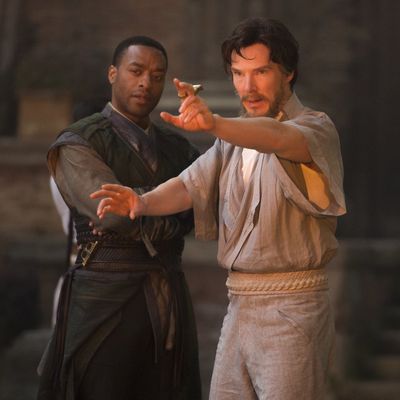
No executive in Hollywood wields more casting power than Kevin Feige. The 43-year-old president of Marvel Studios, Feige can anoint a brand-new A-lister simply by casting an actor as one of his high-profile superheroes, and since the characters crisscross through each other’s films — and, in the case of Chadwick Boseman’s Black Panther, were cast even before a director was picked to helm the character’s stand-alone installment — Feige’s selections carry outsize importance and are heavily scrutinized.
In some ways, Marvel’s latest movie, Doctor Strange, is the culmination of the studio’s increased casting clout: Stocked with tony actors like Benedict Cumberbatch, Chiwetel Ejiofor, and Tilda Swinton, it could read like the call sheet for an awards-season vehicle instead of a reality-bending superhero origin story. That said, the casting has been the subject of controversy, since Feige and director Scott Derrickson took the character of the Ancient One — in the comics, an elderly Asian man who dispenses wisdom to the white title character — and rewrote the role into a Celtic woman played by Swinton. The move was meant to make an end-run around what could have been a stereotypical character, but with so few major roles for Asian talent on the big screen, the revision carried with it brand-new complications.
Still, Feige is listening to the criticism, and as he told Vulture last week, he’s bullish on the increased diversification of the Marvel universe to come. In Strange, the traditionally white role of Mordo was cast with black actor Ejiofor, and the next four Marvel movies feature female leads and love interests played by women of color, including Zoe Saldana in Guardians of the Galaxy Vol. 2, Zendaya in Spider-Man: Homecoming, Tessa Thompson in Thor: Ragnarok, and Lupita Nyong’o in Black Panther. Compare that to the usual superhero casting shortlists — like the many white women vying to play Domino in the soon-to-shoot Deadpool sequel — and it feels like incremental but notable progress.
“I think that in the movies we’ve already made, and certainly in the movies that are coming up, it will be as inclusive a group of characters as one could want,” Feige said. Though he maintained that Marvel will always cast the best actor for the role, Feige also noted, “For us, it’s important that we don’t feel like a completely white, European cast.”
Fans will sometimes cry foul when a character is race-bent, but Feige pointed out that they are drawn from comic books published in an era where pop culture was dominated by white faces. “The comics have felt like that sometimes, in the early days,” he admitted, “but frankly, even the comics in the ‘60s … I mean, Black Panther was created in the ‘60s. You look at Captain America’s team [back then]” — a group of Howling Commandoes that became even more diverse when brought to the big screen for Captain America: The First Avenger — “and yes, there are things to cringe at, but they were being progressive at the time.”
Feige sees Spider-Man: Homecoming as a major step forward on that front. While other Spider-Man films have been set in a lily-white Queens high school, the Jon Watts–directed Homecoming surrounds Tom Holland’s Peter Parker with a much more diverse cast including Tony Revolori, Jacob Batalon, Donald Glover, and two potential love interests played by black actresses: Laura Harrier as Liz Allan and Zendaya as a character rumored to be iconic Spider-Man love interest Mary Jane.
“Our filmmaker came in and had pictures of real high schools, and they are as diverse as you could imagine,” said Feige. “That was something that was important to us, to set it apart from other Spidey films that have been made — to carve that niche — and to have it represent the world today.” So while the six superheroes in the very first Avengers film were all played by white actors, Feige promises that the increasingly populated lineups of Marvel movies to come will add many different faces to the mix. “It’s definitely important to us,” said Feige, “that these movies reflect the world.”

